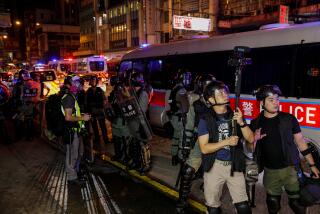4 get life in plot to bomb London
- Share via
LONDON — Four men convicted of conspiracy to murder were sentenced Wednesday to life in prison for their part in failed suicide bombings on London’s public transit system in 2005. They must each serve at least 40 years before being eligible for parole.
Woolwich Crown Court also announced that the two remaining defendants will be retried in the attempted bombings July 21, 2005. No date has been set for the proceedings.
During sentencing, Judge Adrian Fulford linked the botched attacks to London transit bombings two weeks earlier that killed 52 people.
“What happened on July 7 in 2005 is of considerable relevance to this sentencing,” Fulford said. “I have no doubt that they were both part of an Al Qaeda-inspired and controlled sequence of attacks.”
The four defendants were self-confessed ringleader Muktar Said Ibrahim, 29; Ramzi Mohammed, 25; Yassin Omar, 26; and Hussain Osman, 28.
Counter-terrorism specialists dismissed the defendants’ assertions that the bombings were a hoax to prompt the British government to reconsider its involvement in the Afghanistan and Iraq wars.
“They knew what would happen,” Sue Hemming, head of counter-terrorism at the Crown Prosecution Service, said in a statement. “While the implementation of their plan was incompetent, their aim was clear. They wanted to kill and maim on a massive scale.”
Jurors on Tuesday were unable to reach a verdict on Manfo Asiedu, 33, and Adel Yahya, 24, who allegedly played smaller roles in the conspiracy.
Asiedu admitted to knowing that the bombs were real. However, he said he changed his mind and abandoned his unexploded bomb in a park.
Yahya, on the other hand, had been visiting his native Ethiopia for six weeks at the time of the botched attacks. His attorney said that Yahya knew nothing of the conspiracy before he left the country.
Responding to criticism that the government is unable to secure Britain’s borders, Prime Minister Gordon Brown on Wednesday promised to institute more antiterrorism measures, such as the use of technologically advanced identity cards and stricter passport control. Brown did not offer any specifics for the implementation of these measures, however.
“The Home secretary plans to consult, and we are seeking an all-party consensus on new measures to ensure successful prosecutions against terrorist suspects,” he told Parliament.
On Tuesday, Conservative leaders condemned security forces for having granted a passport to Ibrahim, who built the faulty explosives.
During the trial, prosecutors showed that Ibrahim traveled to Sudan in 2003 and Pakistan in 2004, at the same time as July 7 bombers Mohamed Sidique Khan and Shahzad Tanweer.
Ibrahim, who had a criminal record, also attended services at Finsbury Park Mosque, where radical cleric Abu Hamza al Masri preached.
Al Masri is fighting extradition to the United States, where he faces charges in a global terrorism conspiracy. Lawyers for the 49-year-old fundamentalist say that evidence was acquired through torture and should not be used against him.
--
More to Read
Sign up for Essential California
The most important California stories and recommendations in your inbox every morning.
You may occasionally receive promotional content from the Los Angeles Times.













